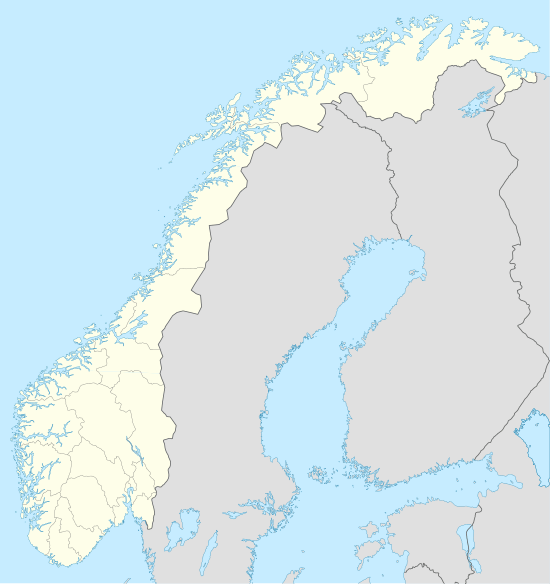Bremanger Church
| Bremanger Church | |
|---|---|
| Bremanger kyrkje | |
|
View of the church | |
 Bremanger Church Location in Sogn og Fjordane county  Bremanger Church Location in Sogn og Fjordane county | |
| 61°53′32″N 5°31′56″E / 61.8921°N 5.5323°ECoordinates: 61°53′32″N 5°31′56″E / 61.8921°N 5.5323°E | |
| Location |
Bremanger Municipality, Sogn og Fjordane |
| Country | Norway |
| Denomination | Church of Norway |
| Churchmanship | Evangelical Lutheran |
| Website | Bremanger Church |
| History | |
| Consecrated | 4 September 1914 |
| Architecture | |
| Status | Parish church |
| Functional status | Active |
| Architect(s) | Anders Karlsen Eid |
| Style | Langkyrkje ("long church") |
| Completed | 1914 |
| Specifications | |
| Materials | Wood |
| Administration | |
| Parish | Bremanger |
| Deanery | Nordfjord prosti |
| Diocese | Diocese of Bjørgvin |
Bremanger Church (Norwegian: Bremanger kyrkje) is a parish church in Bremanger Municipality in Sogn og Fjordane county, Norway. It is located in the village of Bremanger on the island of Bremangerlandet. The church is part of the Bremanger parish in the Nordfjord deanery in the Diocese of Bjørgvin.[1][2]
The wooden "long church" was built in 1914, and it was originally called Bremangerpollen Chapel. The name was changed to Bremanger Church in 1952.[3] The church is located at Hauge, in the innermost part of the Bremangerpollen bay in the municipality of Bremanger. The church, with a seating capacity of 400, was consecrated on 4 September 1914 by the bishop Johan Willoch Erichsen. The architect Anders Karlsen Eid made the designs.[4]
History
Historically, there was a church at Grotle, just west of the village of Bremanger. In 1865, the aging church at Grotle was torn down and the people living in the northern part Bremangerlandet island were without a church of their own. The nearest church was Frøya Church to the south, on the island of Frøya. The people who lived further north on the island complained that the journey to that church had become too long and strenuous. Going by boat around Novene was often a risky undertaking, which kept people from going to church. The people felt that if they got a church in their own village, many more people would get the opportunity to listen to the words of the Lord. These people, even the Vicar, had to eventually yield to such a strong argument, and so the work was started in the 1890s to erect a new church in the village of Hauge (now called Bremanger).
So, the new church was built at Hauge and all of the farms between Vetvik (in the north) and Nøtset (in the south) were transferred to the new Bremangerpollen parish that was established on 1 July 1908 and a few days later a "bedehus" (chapel) was consecrated for church functions. From the village of Vetvik the journey to church was still more than long enough, and for those who chose not to go by boat, the alternative was a three-hour hike across the mountain.[4]
A new church was completed in 1914 to replace the little chapel that was originally used from 1908 until 1914. The stones for the foundation wall were taken from the mountain straight up from the church site. This work was carried out on a voluntary basis by the villagers themselves, in addition to the transportation of the wooden building material.[5]
References
- ↑ "Bremanger kyrkje". Kirkesøk: Kirkebyggdatabasen. Retrieved 2013-11-01.
- ↑ "Oversikt over Nåværende Kirker" (in Norwegian). KirkeKonsulenten.no. Archived from the original on 2015-07-21. Retrieved 2013-11-01.
- ↑ "Bremanger kyrkje". NRK.no. 2007. Retrieved 2008-09-27. External link in
|publisher=(help) - 1 2 Aaraas, Margrethe & Vengen, Sigurd (2000). "Bremanger church". NorthSeaTrail.org. Archived from the original on 2011-07-21. Retrieved 2008-09-27.
- ↑ "Bremanger kyrkje". Sogn og Fjordane Fylkesarkiv. Archived from the original on 2015-09-24. Retrieved 2013-11-01.